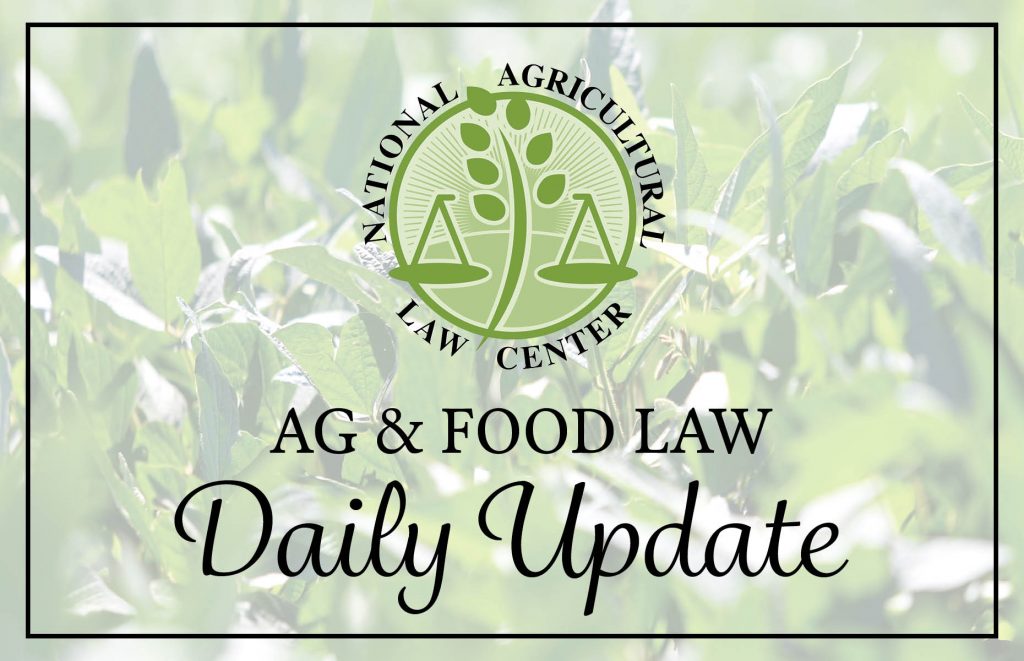A comprehensive summary of today’s judicial, legislative, and regulatory developments in agriculture and food. Email important additions HERE.
JUDICIAL: Includes Washington State, water use
In Loyal Pig, LLC v. Washington State Dep’t of Ecology, No. 36525-5-III, 2020 WL 2122891 (Wash. Ct. App. May 5, 2020), a Washington state Court of Appeals considered the requirements necessary for a party holding a water right under Washington water law to change the location of the usage of the water. Under Washington water law, the process to change the location of usage is administered by the Washington State Department of Ecology (“Ecology”) and requires that the water right holder must calculate its annual consumptive quantity (“ACQ”) of water as defined by state law. In this case, the court concluded that an applicant must recalculate its ACQ every time they apply for a change even if Ecology has already approved an earlier change.
The plaintiff, Loyal Pig, LLC (“Loyal Pig”), holds a water right granted in 1970. Under Washington state law, the water right grants a water right holder an amount of use per year, a rate of flow, a point of diversion, and a location of application. However, any water right holder may apply for a change in the site of diversion, the place of application, or both. Loyal Pig’s predecessor to the water right applied to change the point of diversion in 2014. At that time, Loyal Pig’s predecessor performed an ACQ in accordance with the requirements for the application. By 2017, Loyal Pig had taken over the water right and applied to the local Water Conservancy Board (“Board”) for an additional change in locations of diversion and application. However, instead of performing a new ACQ, Loyal Pig resubmitted the ACQ that had been calculated by its predecessor in 2014. The Water Conservancy Board approved the application, but Ecology reversed the approval because Loyal Pig had used the 2014 ACQ. Loyal Pig appealed this decision, and eventually it ended up in Washington state court. The lower court ruled that Ecology could not require new ACQ calculations for each new application to change a water right and Ecology appealed to this court. On appeal, the court reviewed the language of the applicable state statutes governing applications to change water rights in Washington state. The court concluded that the statutory language supported Ecology’s argument that Loyal Pig must gain calculate its ACQ in order for Ecology to process its 2017 application for a change in the water right. Accordingly, the court ruled in Ecology’s favor.
REGULATORY: Includes AMS, NOAA
AGRICULTURAL MARKETING SERVICE
Final rule implementing a recommendation from the California Walnut Board to suspend the reserve obligation and its requirements currently prescribed under the Federal marketing order for walnuts grown in California. Info here.
2020 sunset review and substance renewals of substances listed on the National List of Allowed and Prohibited Substances within the U.S. Department of Agriculture’s organic regulations. Info here.
Proposed rule adjusting representation on the American Egg Board, established under the Egg Research and Consumer Information Act of 1974, and outlines changes to geographic areas based on sustained changes in egg production in several States. Info here.
Proposed rule inviting comments on a recommendation from the Citrus Administrative Committee to establish reporting requirements under the Federal marketing order for oranges, grapefruit, tangerines, and pummelos grown in Florida. Info here.
NATIONAL OCEANIC AND ATMOSPHERIC ADMINISTRATION
Temporary rule prohibiting retention of Pacific cod by American Fisheries Act trawl catcher/processors in the Bering Sea and Aleutian Islands management area. Info here.
